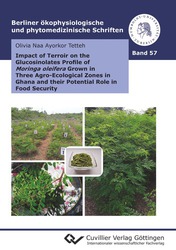| Areas | |
|---|---|
| Serie de libros (97) |
1382
|
| Nachhaltigkeit |
3
|
| Gesundheitswesen |
1
|
| Letra |
2372
|
| Ciencias Naturales |
5408
|
| Matemática | 228 |
| Informática | 320 |
| Física | 980 |
| Química | 1364 |
| Geociencias | 131 |
| Medicina humana | 243 |
| Estomatología | 10 |
| Veterinaria | 108 |
| Farmacia | 147 |
| Biología | 835 |
| Bioquímica, biología molecular, tecnología genética | 121 |
| Biofísica | 25 |
| Nutrición | 45 |
| Agricultura | 1005 |
| Silvicultura | 201 |
| Horticultura | 20 |
| Ecología y conservación de la tierra | 148 |
| Ciencias Ingeniería |
1798
|
| General |
98
|
|
Leitlinien Unfallchirurgie
5. Auflage bestellen |
|
Erweiterte Suche
Impact of Terroir on the Glucosinolates Profile of Moringa oleifera Grown in Three Agro-Ecological Zones in Ghana and their Potential Role in Food Security (Volumen 57) (Tienda española)
Olivia Naa Ayorkor Tetteh (Autor)Previo
Lectura de prueba, PDF (310 KB)
Indice, PDF (200 KB)
Moringa oleifera Lam. can survive extreme growth conditions by adjusting its metabolism. Among the potential metabolites produced during adaptation are glucosinolates, which possess potential cancer chemoprotective attributes.
Recent climate events, such as increased temperatures and prolonged drought, impact crop yield and quality significantly. Therefore, climate-resilient plants such as M. oleifera can be utilized in areas where crop production is adversely affected.
Understanding how terroir factors and cultural practices affect the glucosinolate profile in M. oleifera is important for optimizing cultivation strategies. To achieve this, the leaves from cultivated and wild-grown mature M. oleifera plants were harvested for intact glucosinolates analysis. Prior to the analysis, preserving the plant materials to prevent the breakdown of glucosinolates was important. Given that the use of dehydration methods such as freeze drying for the leaves is expensive and laborious in developing countries like Ghana, a locally well-suited dehydration method, namely oven-drying at 40 °C for 48 h, was identified and utilized.
Results showed that during the rainy season, climate parameters did not significantly influence the total glucosinolates content in all leaf materials harvested. In contrast, accession selection, harvest time, and agro-ecological zones significantly influenced the total glucosinolate content. Fertilization significantly altered the vegetative growth parameters of the cultivated accessions, but not the total glucosinolates content.
In conclusion, M. oleifera proved to be well adapted to the climate in Ghana. The continued collection, storage, and use of the genetic resources of M. oleifera accessions well-adapted to stress conditions are envisaged to ensure the species‘ contribution towards improved food security and nutrition among vulnerable groups.
| ISBN-13 (Impresion) | 9783736979772 |
| ISBN-13 (E-Book) | 9783736969773 |
| Formato | A5 |
| Idioma | Inglés |
| Numero de paginas | 192 |
| Laminacion de la cubierta | mate |
| Edicion | 1 |
| Serie | Berliner ökophysiologische und phytomedizinische Schriften |
| Volumen | 57 |
| Lugar de publicacion | Göttingen |
| Lugar de la disertacion | Universität Berlin |
| Fecha de publicacion | 28.03.2024 |
| Clasificacion simple | Tesis doctoral |
| Area |
Química analítica
Biología Agricultura |
| Palabras claves | Glucosinolate, Ernteverfahren, Trocknungsmethoden, Mikronährstofferhebung, micronutrient survey, glucosinolates, harvest techniques, drying methods, agro-ecological zones, climate, soil, elevation, fertilization, accession, harvest time, micronutreint deficiency, agrarökologische Zonen, Klima, Boden, Höhenlage, Düngung, Anbau, Erntezeit, Mikronährstoffmangel, Internationale Agentur für Krebsforschung, International Agency for Research on Cancer, Hochleistungsflüssigkeitschromatographie, High Performance Liquid Chromatography |








